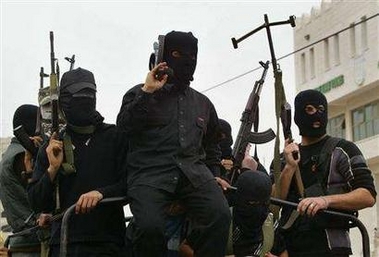The Hamas-led Palestinian government and President Mahmoud Abbas's Fatah
group agreed early on Sunday to try to end tensions between them after their
supporters clashed in the worst internal fighting in months.

Palestinians gunmen
from the Fatah movement attend a protest against Hamas political leader
Khaled Meshaal, at the Khan Younis refugee camp in the southern Gaza Strip
April 22, 2006. Dozens of Palestinians on Saturday clashed in Gaza in the
worst internal fighting in months over a security dispute between the
Hamas-led Palestinian government and President Mahmoud Abbas.
[Reuters] |
The armed confrontations in Gaza
on Saturday, which wounded 20 people, followed the condemnation by exiled Hamas
leader Khaled Meshaal of Abbas's veto of a new Gaza security force, formed by
Hamas and headed by a top militant.
"The two parties have agreed to call on our people to stop all forms of
tension and to cement national unity," Fatah spokesman Mahar Meqdad told
reporters after a meeting between the groups, mediated by Egyptian officials.
Officials from the groups did not elaborate on what practical steps would be
taken on the ground to stop violence.
"Internal orders were given to guarantee there would be no return to
friction," said Hamas spokesman Sami Abu Zuhri, adding that a joint Hamas-Fatah
committee would be formed to discuss how to handle any future disputes between
the groups.
The appointment of Jamal Abu Samhadana, head of the Popular Resistance
Committees which has often attacked Israel, as leader of a new Gaza police force
was widely seen as an attempt by Hamas to strengthen its grip on the Interior
Ministry.
Abbas canceled the decision, a veto Meshaal said assisted a Western campaign
to isolate the Palestinian government.
Students and militants loyal to Hamas or to Fatah took to the street,
exchanging gunfire in Gaza and wounding 20 people.
Chanting "Meshaal is a traitor," thousands of Fatah loyalists marched in
Gaza, some firing rifles in the air. Many also protested in the West Bank.
Meshaal said after the violence on Saturday that Hamas respected Abbas's
authority and called for Palestinian unity, saying: "We were united during the
(uprising) in confronting the Israeli occupation. Today we have to be united in
politics."
The Interior Ministry said the new Gaza force would work from within the
existing security establishment, headed mainly by Fatah loyalists, but Abbas's
aides said only the Palestinian president could make decisions regarding the
government.
The Gaza Strip has seen growing lawlessness in recent years among members of
rival armed groups but Hamas and Fatah had rarely engaged in violent
confrontations.
Hamas, a militant group sworn to destroying Israel, beat Fatah in a January
vote to head the Palestinian government.
Hamas carried out about 60 suicide bombings during a 2000 uprising but has
largely abided by a truce since last year.
Cabinet spokesman Ghazi Hamad said aides to Abbas and Prime Minister Ismail
Haniyeh would meet to try to solve the Gaza security dispute ahead of a meeting
between the leaders later in the month when Abbas returns from a visit abroad.